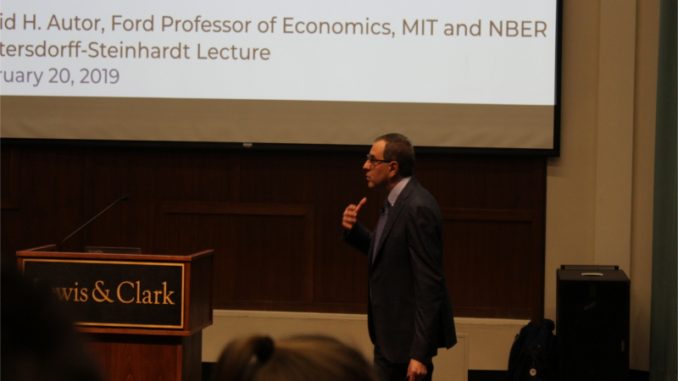
Each year, the Lewis & Clark Department of Economics selects a distinguished economist to deliver the Mattersdorff-Steinhardt lecture, named after two long-time former LC economics professors. This year, David Autor, Professor of Economics at the Massachusetts Institute of Technology (MIT), was chosen to give the keynote address. Autor presented his research on Feb. 20 during two separate gatherings, covering his work on population distribution, education and contemporary labor markets.
In the afternoon, Autor engaged in a more technical conversation on his research oriented toward economics faculty and students. This was followed by the evening lecture at 7:30 p.m. in the Council Chamber directed toward the general public.
Autor is regarded among the most well-known voices in historical and modern labor economics today. Though his work covers many areas of the field, Autor’s research on the labor market and globalization has garnered him many awards and considerable academic attention.
Associate Professor of Economics and Department Chair Clifford Bekar opened the evening lecture with an introduction to Autor’s professional accomplishments. Bekar noted that Autor succeeds in crossing difficult boundaries in economic research, contributing immensely to some of the most perplexing policy issues.
“Oftentimes when economists do work that’s near the theoretical or empirical frontier, it can diverge a little bit from policy matters that confront the country,” Bekar said. “(Autor’s) work is theoretically rigorous, empirically careful but fully informed by the questions that confront us today.”
Autor’s lecture featured new research first presented to the public only seven weeks ago. Though the research is complex, Autor made careful assertions and use limited technical language to educate those without an expansive economics background.
“This research is going to give you a perspective on not just how work is changing but where work is changing, and how the geography of work and the location of jobs is changing really dramatically,” Autor said.
Autor discussed fluctuations in U.S. labor markets, occupations and wages since the mid-20th century. Autor argued that, over time, there has been increased polarization between highly-educated, high-income workers and all other labor demographics, resulting in overall stasis and decline of middle-income and low-income job opportunities.
For example, the U.S. manufacturing industry, a traditionally prosperous middle-skill labor sector, has largely dissipated with the increased demand for highly-educated workers in urban areas. Naturally, the need for more technical employees has resulted in unprecedented increases in educational return, largely leaving behind those that specialize in formerly-robust labor sectors.
Additionally, Autor explained that highly educated workers, of which there are more than ever before, gravitate toward urban areas. This is because U.S. cities house firms that demand educated employees, resulting in a rigid dichotomy between urban labor and rural labor opportunities. While this may initially appear inconvenient for less-educated workers, Autor argued that instead of following the highly-educated to cities, those without post-high school education should concentrate in rural areas. The less educated workforce does not necessarily face a sharp income disparity, and their wages certainly depend on where they decide to locate for jobs.
Much of Autor’s research speaks specifically to current college students. In the lecture, Autor informed the audience why college-educated individuals congregate in urban areas.
“Young adults are following the money,” Autor said. “Cities are getting younger and young adults are moving to opportunity and staying there. They are going to cities when they go for college education and then they are sticking around because those are good places to be.”
Ultimately, Autor urges all young people to pursue advanced education if possible. Stuart Myers ’21, an economics major, discussed the benefits of education as presented by Autor, commenting on how appreciative college-educated students should be.
“Be cool, stay in school,” Myers said. “Seriously. (The lecture) really made me think a lot about how fortunate I am to have access to an education and how important that education is.”
Myers also admired the clarity of Autor’s presentation, as well as the connection Autor made with audience members familiar with basic labor economics principles.
“Most of the trends that (Autor) discussed were things that I had an educated guess were happening, but it was super cool to see those hunches reflected in concrete historical statistics,” Myers said.
As labor continues to be divided by education and income level, the workforce in urban and rural areas will largely be determined by the demand for highly-specialized employees. If young adults hope to hold stable, lucrative jobs, Autor notes that the best opportunities come with higher education and urban living.
Subscribe to the Mossy Log Newsletter
Stay up to date with the goings-on at Lewis & Clark! Get the top stories or your favorite section delivered to your inbox whenever we release a new issue.

Leave a Reply